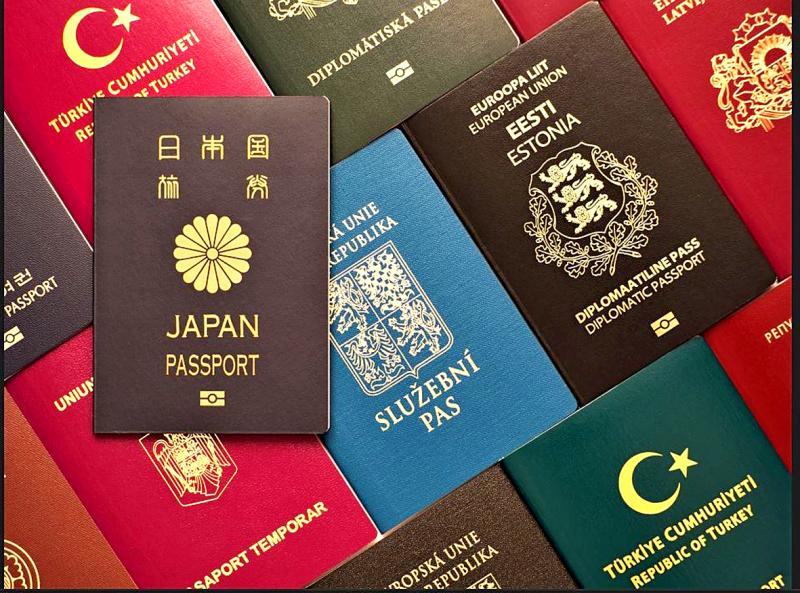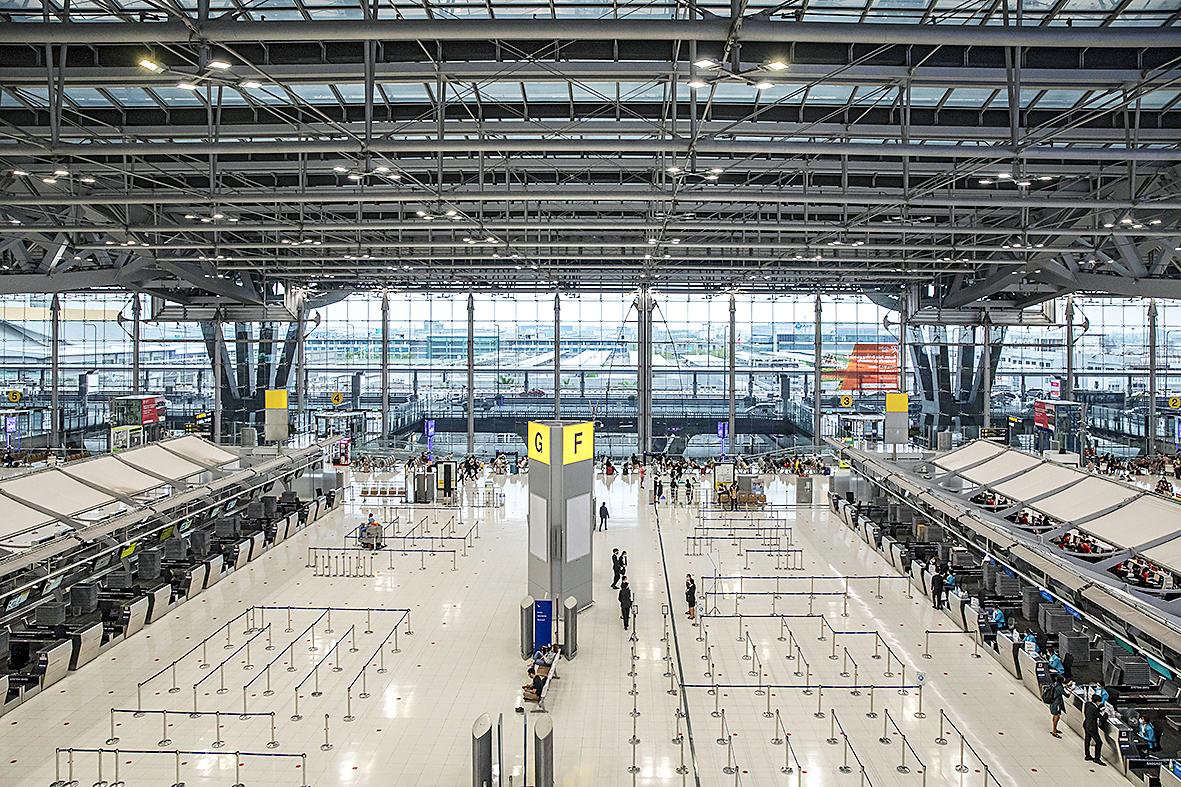On March 1, when the government relaxed the pandemic-era rules which limit foreign nationals traveling to Taiwan, John Frazier couldn’t help but feel disappointed. The changes didn’t help him one bit.
Frazier, who has lived in Kaohsiung on and off since 2016, most recently passed through immigration control in February last year. As a US citizen, he was eligible for Taiwan’s visa exemption program, and permitted to stay for up to 90 days:
“I didn’t consider getting a visa before flying in, because visa-free entry is so convenient. I planned to get married in April, then fly out before the 90 days was up in order to return with a visa which I would then convert into a JFRV [joining family resident visa],” says the Tennesseean.

Photo courtesy of New Taipei City Government
Frazier and his fiancee, a Taichung native surnamed Chang (張), celebrated their wedding as planned, but by the time of their nuptials, they’d abandoned any hopes of an overseas honeymoon. Since then, Frazier has been trying unsuccessfully to attain a resident visa.
The couple has visited the Ministry of Foreign Affairs’ Southern Taiwan Office at least five times in his quest for residency status. Each time they’ve enquired, they’ve been told that Frazier can’t convert his visa-exempt entry into a resident visa.
If he left the country and returned on a visitor visa, officials have explained, the ministry’s Bureau of Consular Affairs (BOCA) could change it to a resident visa, and then the Ministry of the Interior’s National Immigration Agency would issue an alien resident certificate (ARC).

photo: Bloomberg
Frazier points out that foreign nationals coming to Taiwan to work don’t have to fly out and reenter before switching from visa-exempt entry to residency, and he can’t think of a good reason why foreigners married to Taiwanese should be required to incur the cost of a trip to another country and take the risk of catching COVID-19.
Frazier’s original visa-exempt entry privilege expired in May last year. However, he’s been able to stay in Taiwan legally, because the government has announced a series of automatic extensions.
“The same official keeps telling us that the extension is generous enough, and that we should be thankful and not complain. When I say, ‘Yes, we’re grateful — but I need a work permit and I don’t want to risk not being allowed back in Taiwan, or bringing the virus into the country,’ she tells me it’s not her problem and those are the rules,” says Frazier.
“It makes no sense to leave if you’re already here. They’re willing to keep giving extensions, but eventually your passport will expire,” he says. What’s more, he points out, because many countries have closed their borders to non-citizens and so many flights have been cancelled, it’s by no means certain he’d be able to visit a Taiwan representative office overseas in order to apply for a visitor visa.
“It’d be awesome to have health insurance and a work permit,” says Frazier.
Foreign spouses with residency enjoy broad working rights. They can legally hold more than one job at a time, and companies can hire them without doing extra paperwork.
Asked why he doesn’t seek an English-teaching job, which would give him working permission (limited to one designated employer) and access to Taiwan’s National Health Insurance program, Frazier says that he didn’t finish college.
In addition to having a college degree, foreign English teachers must also obtain proof they don’t have a criminal record. In many places, background checks are taking months to complete, because COVID-19 has closed courts and government offices.
Michael Jones, another Kaohsiung resident, has found himself in an identical predicament.
The New Zealander has been in Taiwan since November 2017.
“I met my wife February 2018, and we got married August last year,” says Jones.
Because his most recent entry was visa exempt, Jones has also been unable to obtain a resident visa.
“Normally I could just leave Taiwan and return on a visitor visa. But, as we all know, these aren’t normal times,” he rues.
For several months, he and Frazier have been in a visa limbo, “not knowing if we’re going to be able to stay past the next extension deadline the immigration announces on about 14th of every month. It’s been very stressful.”
“I dread travelling back to New Zealand right now. COVID-19 is currently under control there, so once back inside the country I’d be fine. It’s the flight and transfers I’d need to make that have me worried. There’s a real risk of getting infected,” says Jones.
He’s also alarmed by the prospect of being separated from his wife for what could be months due to quarantine rules.
“I wish to stay in Taiwan, to live, work and pay taxes. Unfortunately, this isn’t likely without a change in the immigration rules,” Jones says.
OPAQUE RULES
“The rules that allow you to change your visa are extraordinarily opaque and incomplete,” says Michael Fahey, an associate at the Taipei law firm of Winkler Partners.
“Some of them have been in effect for some time, and we know about them,” he goes on to say. “For example, foreign spouses of Taiwanese citizens must enter on a visa, if they hope to attain residency. Yet this isn’t clearly stated on any official Web site, and we can’t find any regulatory basis. We can only conclude they have internal rules which they follow,” says the Californian lawyer.
BOCA’s response to an e-mail sent on Nov. 25 didn’t explicitly confirm the existence of any such rule.
As of writing, a March 8 e-mail to MOFA repeating the question — and asking if, for the purposes of converting visa-exempt entry to a resident visa, COVID-19 could qualify as “force majeure” or “emergency” — had gone unanswered.
Some central government units publish the guidelines they’ve compiled to help civil servants interpret and apply laws — “and they’re extremely useful,” Fahey says. But in the case of BOCA, “We don’t know if such guidelines even exist.”
“In the case of spouses, I think they could sometimes grant exceptions,” says Fahey, who has come across other cases where he thinks BOCA could have displayed a little more flexibility.
Last year, a foreign faculty member at a local university struggled to regularize his son’s immigration status.
The boy, a minor, arrived in Taiwan pre-pandemic using visa-exempt entry. For five months, his parents were told there was no way the boy could obtain a resident visa without first leaving and reentering the country.
The authorities eventually relented, and made an exception so the boy didn’t have to take a trip overseas. But, Fahey notes, “It was certainly an unpleasant experience for the parents, and must have left a bad taste in their mouths.”
Fahey tried unsuccessfully to help a foreign professional who’d entered Taiwan in late 2020 on a type of visitor visa issued for attending conferences and exhibitions.
After arrival, he was approved for an Employment Gold Card, but was told to leave and apply for a new visa, because — both Winkler Partners and their client were surprised to be told — the kind he held couldn’t be converted to a resident visa.
BOCA’s Web site doesn’t state that this kind of visitor visa can never be changed to a resident visa, Fahey points out. He has no doubt that, if his client had arrived visa exempt, he would’ve been allowed to complete the process without leaving the country.
For well over a decade, Taiwan’s leaders have been expressing concern about the country’s aging population and low birthrate. Immigration reforms might mitigate the demographic crisis.
The government has made it easier for children of foreign parents to stay into adulthood. But in other areas, like dual nationality, progress has been millimetrical. The way it looks now, already-arrived foreign spouses like Frazier and Jones will have to wait for the pandemic to abate before they can safely formalize their position.
Taiwan has rules designed to prevent people coming in and getting married as a cover for working or other activity, says Fahey. “But the rules aren’t set out clearly. Normally this isn’t a big problem, because Taiwan is quite generous and reasonable about changing from visa-exempt to holding a work permit. The pandemic has really flushed out into the open some of these visa issues. Beforehand, there were minor problems, but COVID-19 has shown the lack of clarity matters.”

March 10 to March 16 Although it failed to become popular, March of the Black Cats (烏貓進行曲) was the first Taiwanese record to have “pop song” printed on the label. Released in March 1929 under Eagle Records, a subsidiary of the Japanese-owned Columbia Records, the Hoklo (commonly known as Taiwanese) lyrics followed the traditional seven characters per verse of Taiwanese opera, but the instrumentation was Western, performed by Eagle’s in-house orchestra. The singer was entertainer Chiu-chan (秋蟾). In fact, a cover of a Xiamen folk song by Chiu-chan released around the same time, Plum Widow Missing Her Husband (雪梅思君), enjoyed more

Last week Elbridge Colby, US President Donald Trump’s nominee for under secretary of defense for policy, a key advisory position, said in his Senate confirmation hearing that Taiwan defense spending should be 10 percent of GDP “at least something in that ballpark, really focused on their defense.” He added: “So we need to properly incentivize them.” Much commentary focused on the 10 percent figure, and rightly so. Colby is not wrong in one respect — Taiwan does need to spend more. But the steady escalation in the proportion of GDP from 3 percent to 5 percent to 10 percent that advocates

From insomniacs to party-goers, doting couples, tired paramedics and Johannesburg’s golden youth, The Pantry, a petrol station doubling as a gourmet deli, has become unmissable on the nightlife scene of South Africa’s biggest city. Open 24 hours a day, the establishment which opened three years ago is a haven for revelers looking for a midnight snack to sober up after the bars and nightclubs close at 2am or 5am. “Believe me, we see it all here,” sighs a cashier. Before the curtains open on Johannesburg’s infamous party scene, the evening gets off to a gentle start. On a Friday at around 6pm,

A series of dramatic news items dropped last month that shed light on Chinese Communist Party (CCP) attitudes towards three candidates for last year’s presidential election: Taiwan People’s Party (TPP) founder Ko Wen-je (柯文哲), Terry Gou (郭台銘), founder of Hon Hai Precision Industry Co (鴻海精密), also known as Foxconn Technology Group (富士康科技集團), and New Taipei City Mayor Hou You-yi (侯友宜) of the Chinese Nationalist Party (KMT). It also revealed deep blue support for Ko and Gou from inside the KMT, how they interacted with the CCP and alleged election interference involving NT$100 million (US$3.05 million) or more raised by the